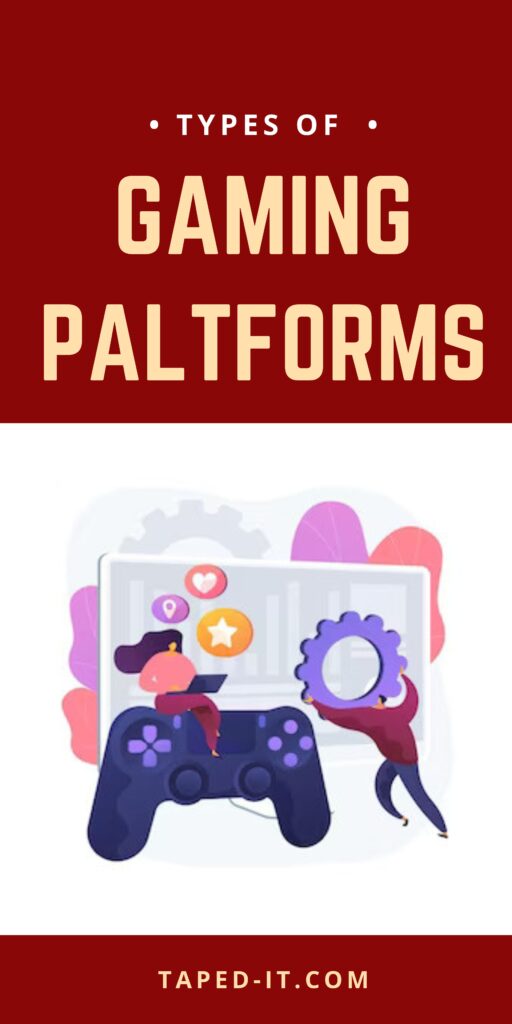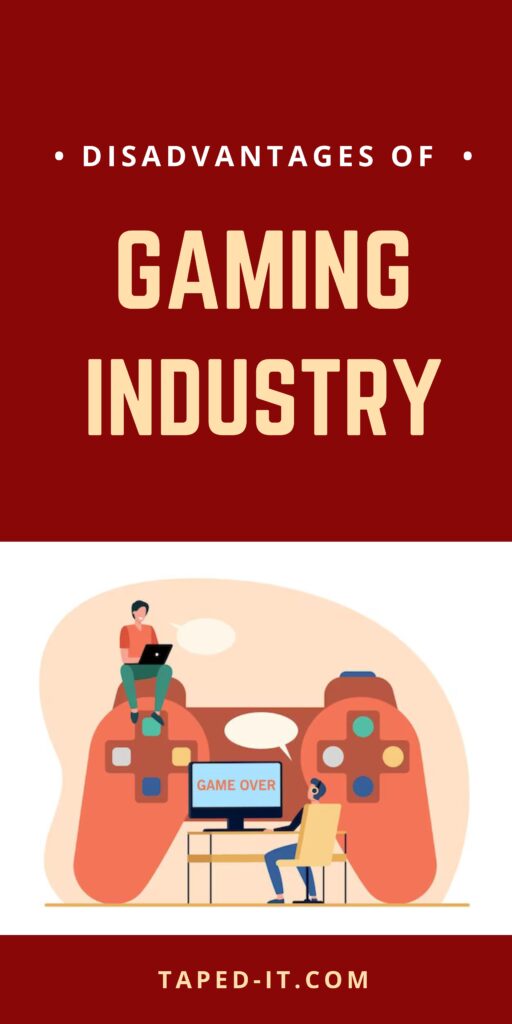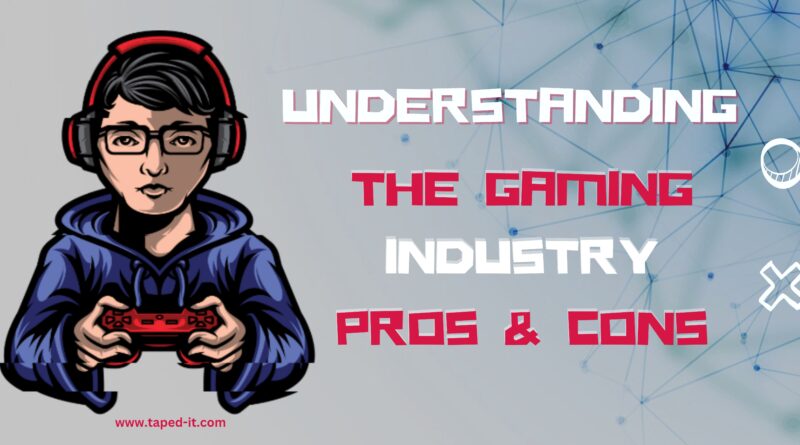Understanding Gaming Industry : Pros and Cons
The gaming industry is expected to remain relevant in 2023 and beyond, driven by increasing popularity, growing revenue, the rise of esports, and continued technological advancements.
The industry has seen tremendous growth over the past few years, with the COVID-19 pandemic driving even more interest in gaming as people looked for ways to entertain themselves at home.
Table of Content
Understanding Gaming Industry
Understanding Gaming Industry and its Pros and Cons
The gaming industry is in the business of making, selling, and distributing video games, mobile games, and other gaming hardware, accessories, and interactive digital entertainment.
It includes a wide range of companies. It can range from small, independent studios to large, multinational corporations. There are also many different types of games, such as:
- Action,
- Adventure,
- Puzzle,
- Role-playing,
- Simulation,
- Sports,
- Strategy,
- Etc.
In the past few years, the gaming industry has grown a lot. It is still growing as more people play games and more money is made from them.
The industry makes money in many ways. Such as selling physical and digital games, allowing in-game purchases, and running ads.
Different types of Gaming Platforms
There are several types of gaming platforms, including:

- Console Gaming Platforms: PlayStation, Xbox, and Nintendo are some of the popular examples of console gaming platforms. Players use a dedicated device to play games on a TV or monitor.
- PC Gaming Platforms: Personal computers are the most common gaming platform. It comes with a wide variety of games available through online marketplaces such as Steam or GOG.
- Mobile Gaming Platforms: Mobile devices such as smartphones and tablets have become popular gaming platforms due to their widespread availability and convenience. Games are available through app stores such as the Apple App Store or Google Play.
- Web-Based Gaming Platforms: Games played through a web browser using HTML5, Flash, or other web technologies. If you have access to the internet, you can play these games on any device.
- Virtual Reality Gaming Platforms: Virtual reality headset devices provide a more immersive gaming experience. The players are able to interact with and control the game through head movements and hand gestures.
- Cloud Gaming Platforms: Games are streamed to a device over the internet, eliminating the need for local hardware and allowing players to access games on any device with a stable internet connection.
Fundamentals of the Gaming Industry
The fundamentals of the gaming industry include:
- Game Development: The process of creating and designing a video game, including aspects such as programming, art, sound design, game design, and testing.
- Game Engines: The software platform that is used to develop a video game, which provides the underlying technology and tools needed to create a game.
- Game Design: The process of creating the concept, mechanics, and structure of a game, including aspects such as game rules, level design, and player experience.
- Game Art: The visual components of a game, including characters, environments, and special effects.
- Game Sound: The audio components of a game, including music, sound effects, and voice acting.
- Game Testing: The process of playing a game to find and report bugs and other technical issues, and to ensure that the game meets the required standards.
- Game Distribution: The process of publishing and distributing a game to the market, including aspects such as marketing, pricing, and platform selection.
- Game Monetization: The process of generating revenue from a game, including methods such as sales of physical and digital games, in-game purchases, and advertising.
- Game Culture: The community of players, developers, and enthusiasts who are passionate about video games and the gaming industry.

The gaming industry is constantly evolving, with new technologies, platforms, and trends emerging regularly. If you want to be successful in the gaming industry as a developer, designer, marketer, or fan, you need to know these basics.
Advantages of the Gaming Industry
Understanding Gaming Industry: Advantages
The gaming industry provides many benefits and advantages, including:

- Economic Impact: The gaming industry generates billions of dollars in revenue each year and provides job opportunities for a wide range of professionals, from game developers and designers to marketers and business developers.
- Innovation: The gaming industry is a driver of innovation, pushing the boundaries of technology, creativity, and user experience, and contributing to advancements in areas such as artificial intelligence, cloud computing, and virtual reality.
- Entertainment: Gaming offers a form of entertainment and escapism for players of all ages and backgrounds, providing a way to relax, have fun, and engage with friends and family.
- Social Connections: Gaming provides an opportunity for players to connect with each other and form communities, whether through online gaming, esports, or local gaming groups.
- Education and Skill Development: Gaming can also be used as a tool for education and skill development, with games that focus on areas such as science, history, and problem-solving.
- Emotional Well-Being: Gaming has been shown to have positive effects on emotional well-being, helping players to reduce stress and anxiety, and improve mood and focus.
- Cultural Significance: Gaming is a cultural phenomenon, with a rich history and impact that extends far beyond just entertainment and is recognized as an art form and a medium for self-expression.
Overall, the gaming industry gives us a lot of benefits and helps shape our society, culture, and economy in important ways.
Scope of the Gaming Industry
The gaming industry is a rapidly growing and dynamic sector, with a global reach and significant economic impact. Some key aspects of the scope of the gaming industry include:
- Market Size: The gaming industry generates billions of dollars in revenue each year, and is expected to continue growing in the coming years.
- Global Reach: The gaming industry has a global reach, with players and fans in every region of the world.
- Diverse Platforms: The gaming industry encompasses a wide range of platforms, including consoles, PCs, mobile devices, web browsers, and VR/AR devices.
- Growing Player Base: The number of players and fans of video games is growing steadily, driven by factors such as increasing accessibility, expanding demographics, and the rise of esports.
- Multi-Billion Dollar Industry: The gaming industry is a multi-billion dollar industry, encompassing a wide range of companies and professionals, from small independent studios to large multinational corporations.
- Impact on Other Industries: The gaming industry has a significant impact on other industries, such as technology, media, and entertainment, and is driving innovation in areas such as artificial intelligence, cloud computing, and virtual reality.
- Job Opportunities: The gaming industry provides a wide range of job opportunities, from game development and design to marketing and business development, and requires a diverse range of skills, from technical and creative to business and management.

Overall, the scope of the gaming industry is vast and offers significant opportunities for growth and innovation, as well as for careers and personal fulfillment.
Disadvantages of the Gaming Industry
Understanding Gaming Industry: Disadvantages
The gaming industry is not without its drawbacks, including:

- Addiction: Gaming can become addictive, particularly for individuals who spend excessive amounts of time playing, leading to negative impacts on physical and mental health, relationships, and daily life.
- Violence and Aggression: Some studies have suggested that playing violent video games can lead to increased aggression and desensitization to violence.
- Social isolation: Spending excessive amounts of time playing games can lead to social isolation and reduced face-to-face interactions with friends, family, and other people.
- Poor Physical Health: Sitting for long periods of time playing games can lead to a sedentary lifestyle and poor physical health, including issues such as obesity, back pain, and eye strain.
- Content Concerns: Some games contain content that may be inappropriate for certain age groups or that may promote negative values, leading to concerns about the impact on young players.
- Financial Costs: The cost of purchasing games and gaming hardware, as well as the potential for in-game purchases, can add up and become a financial burden for some individuals.
- Disparities in Representation and Inclusion: The gaming industry has faced criticism for a lack of representation and inclusion, with some groups, such as women and minorities, feeling underrepresented in games and the industry as a whole.
In order to understanding gaming industry, the above-mentioned problems show:
- how important it is for people to play games responsibly,
- to be aware of how much time they spend gaming, and
- for the gaming industry to deal with issues of representation and inclusion.
Monetizing through Gaming
There are several ways to monetize through the gaming industry, including:
- Retail Sales: The sale of physical copies of games in stores or online, as well as the sale of gaming hardware such as consoles and accessories.
- Digital Downloads: The sale of digital copies of games through online marketplaces such as Steam, Xbox Live, and the PlayStation Network.
- Free-to-Play (F2P) with In-App Purchases: Games that are free to download and play, but rely on monetization through in-game purchases, such as cosmetic items, power-ups, and additional levels.
- Subscription-Based: Games that require a monthly or annual fee to access, often with additional benefits such as early access to new content and exclusive bonuses.
- Mobile Gaming: The sale of games on mobile devices, either through paid downloads or through free-to-play models with in-app purchases.
- Esports: The professional competitive gaming industry, with revenue generated through sponsorships, advertising, ticket sales, and broadcast rights.
- Licensing and Merchandise: The licensing of games for use in other media, such as films and television shows, as well as the sale of gaming-related merchandise such as clothing and toys.
- Advertising: In-game advertising, where brands pay to have their products or services featured in games.
- Crowdfunding: Raising funds for game development through platforms such as Kickstarter and Indiegogo.

It is important to consider the target audience, type of game, and platform when deciding on the best monetization strategy. A combination of these methods may also be used to maximize revenue potential.
For success in the gaming industry, it’s also important to keep up with the latest industry trends and player preferences.
Career in Gaming Industry
The gaming industry offers a wide range of career opportunities, including:

- Game Developer: A game developer is responsible for the creation and design of video games, and may specialize in areas such as programming, art, sound design, or game design.
- Game Designer: A game designer is responsible for the overall concept and gameplay mechanics of a game and works closely with the development team to bring the game to life.
- Artist: An artist creates the visual elements of a game, including characters, environments, and special effects.
- Animator: An animator creates the movement and behavior of characters and objects in a game.
- Programmer: A programmer writes the code that makes the game work, and may specialize in areas such as game engines, AI, or physics.
- Sound Designer: A sound designer creates the audio components of a game, including music, sound effects, and voice acting.
- Quality Assurance (QA) Tester: A QA tester plays the game to find and report bugs and other technical issues and ensures that the game meets the required standards.
- Marketing and Business Development: These roles focus on promoting the game and building relationships with partners, such as publishers and distributors.
A career in the gaming industry requires a combination of technical and creative skills, as well as a passion for games and the ability to work well as part of a team. Many jobs in the gaming industry also require formal education or training in areas like computer science, game design, or digital media.
SUMMARY
The gaming industry generates revenue through various means such as sales of physical and digital games, in-game purchases, and advertising.
Mobile devices such as smartphones and tablets have become popular gaming platforms due to their widespread availability and convenience. Understanding these fundamentals is essential for success in the gaming industry.
The gaming industry provides a wide range of job & business opportunities, from game development and design to marketing and business development. Hence, a career in the gaming industry requires a combination of technical and creative skills, as well as a passion for games and the ability to work well as part of a team.
Some groups, such as women and minorities, feel underrepresented in games and the industry as a whole. Gaming can become addictive, particularly for individuals who spend excessive amounts of time playing.
Keep following Taped-It for more exciting content.



